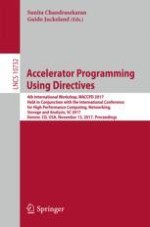2018 | Buch
Accelerator Programming Using Directives
4th International Workshop, WACCPD 2017, Held in Conjunction with the International Conference for High Performance Computing, Networking, Storage and Analysis, SC 2017, Denver, CO, USA, November 13, 2017, Proceedings
herausgegeben von: Prof. Sunita Chandrasekaran, Guido Juckeland
Verlag: Springer International Publishing
Buchreihe : Lecture Notes in Computer Science
